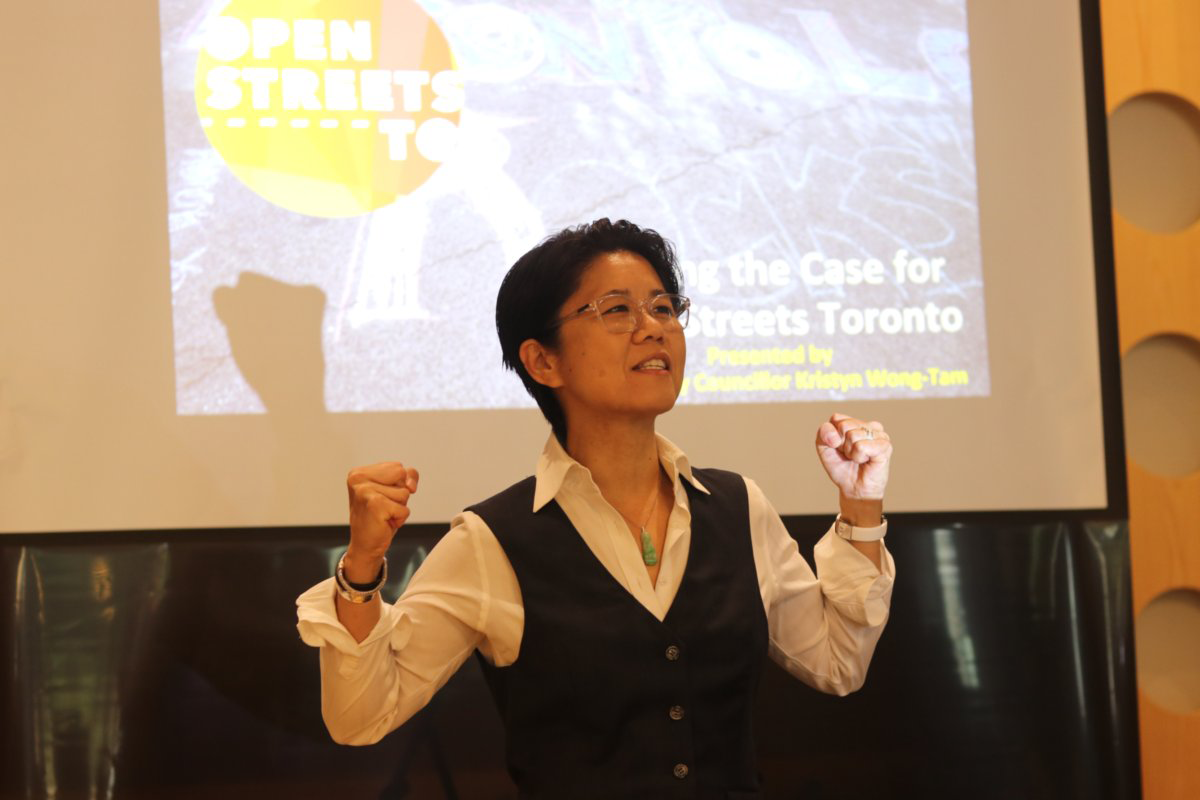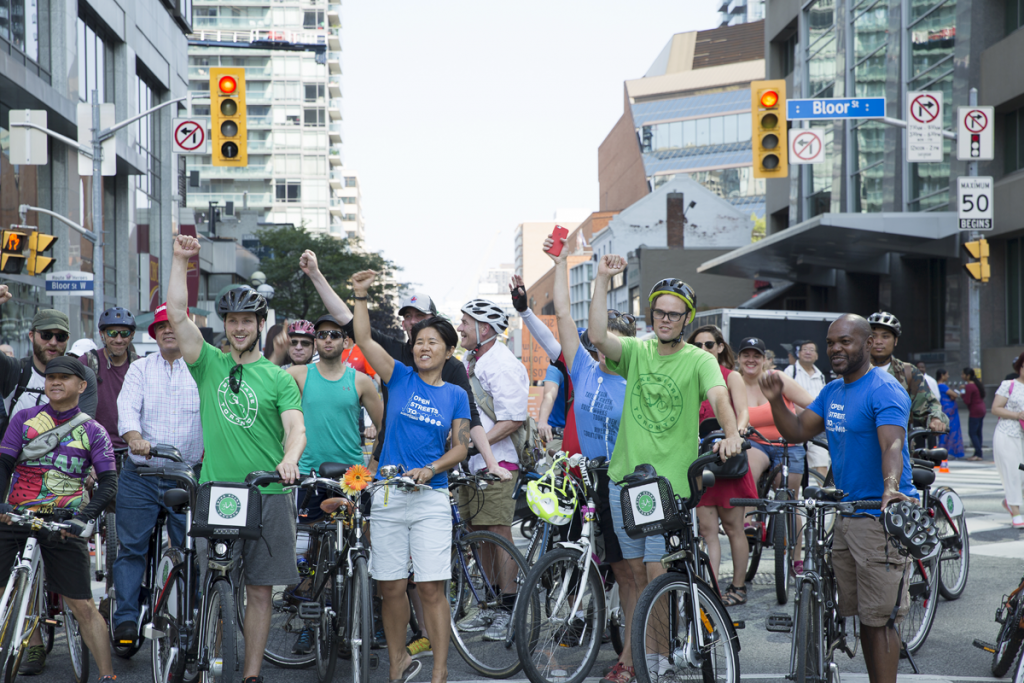
19 Jul 8 Questions with Councillor Kristyn Wong-Tam
In 8 Questions, 8 80 Cities asks amazing partners we’ve worked with, or amazing people doing amazing work 8 questions about their passions, their history, and their amazing-ness. And then we ask them to suggest a question for our next interviewee.
This week, 8 80 Cities Project Manager, David Simor spoke to Toronto City Councillor Kristyn Wong-Tam about her approach to community engagement, active citizenship, and how governmental systems aren’t designed for inclusion. Kristyn has represented Toronto’s Ward 27 since 2010. At City Hall, she has been a vocal champion for social justice, active transportation, expansion of green space, and inclusive planning. A tireless community advocate, prior to her election, she served as co-founder of Asian Canadians for Equal Marriage and president of the Chinese Canadian National Council Toronto Chapter. A successful entrepreneur, Kristyn owned and ran several of her own businesses, was a founding member of the Church-Wellesley Village Business Improvement Association and served as an advisory for Mayor David Miller’s Economic Competitiveness Advisory Committee.
1. When you hear the term community engagement, what do you think of?
Kristyn: I think that it must be active and inclusive. When we’re talking to diverse communities, it starts with recognizing and respecting that people are coming from a range of social locations, whether by age, by gender, sexual orientation, ethnicity, religion. For us to really engage and bring in the widest number of people, we’ve got to make sure it’s inclusive. Active inclusion. But not just active and inclusive, but participatory too, so that people are not coming to a meeting and being talked at, but rather people are coming to a meeting and being listened to. That means that we must encourage the most wide-ranging and active participation possible, so people are producers and not necessarily treated as consumers.
2. Before being elected to City Council, what was your experience working with government as a resident and advocate?
Kristyn: I worked on social justice issues, I worked on various neighbourhood enhancement projects, but I would say that when it got to the core of government decision making and policy, I felt quite removed. Even though I was a very active citizen. Which is interesting because you would image an active citizen being very up front and personal with government officials, but that was not my experience. I recognize now, I have a fuller understanding of where power lies and how decisions are influenced that there is really a much smaller number of people who have direct access to government officials. And I think in many ways that informs how I now do my work.
8 80 Cities: Did you feel, when you weren’t getting inside, getting to those people who make decisions, did it feel like it was designed to keep you on the outside?
Kristyn: I would say yes. The system is not designed to bring in the widest range of voices. Even the way, and this is interesting, because municipal government is the most open and accessible order of government, and even at this level of government, it is in fact rather closed off to many citizens and residents. For those individuals who are trying to connect and influence provincial and national governments, it’s even harder. Even as someone who holds elected office at the municipal level, I have a hard time influencing provincial and federal policy. And I’m an elected official! So, can you imagine the average citizen who doesn’t hold political office, doesn’t have political sway, I can really understand sometimes why people feel disillusioned with the political apparatus.
3. In your pre-City Councillor life, did you find government treated you differently as an entrepreneur versus as a community advocate?
Kristyn: Great question. I feel that my outward personality boasts more of a community advocate. Just the issues I was louder on. Even as an entrepreneur, I was always able to raise issues and say, ‘I’ve got this concern’. But certainly, as someone who was the owner of several successful businesses, governments do treat you differently. I recognize that. I was not the owner and operator of any large company, mine were mostly small, under 50 employees. Maybe I managed a company that was a medium sized business, but certainly there is a different level of respect and they take you more seriously when you appear before government as an entrepreneur, or if you support the capitalist structure. Now, if I was appearing before them as a community advocate only, without the personal context of being a successful entrepreneur, I suspect some of my issues would have been more quickly dismissed. I also was a donor to different politicians and supported various campaigns based on the values that I had. Of course, parties I supported never ended up in power really.
4. Now that you’re at City Hall, as a City Councillor, how do you think about engagement differently?
Kristyn: I am obsessed with finding a way to bring the most people to the table. I’m not interested in speaking to the same usual suspects because that creates an echo chamber. I’m interested in hearing a wide range of opinions, so I can stress test my own ideas and values. It gives me a sense of whether the policies and the programs and the services government is supposed to deliver, whether they are going to be effective and useful. That’s one of the biggest changes I’ve learned.

5. What would you say have been the biggest obstacles to you as an elected official in engaging communities in a more productive way?
Kristyn: I want to see residents and citizens as diverse as the community they live in and the communities I serve, I want them to be engaged. I recognize that there several structural barriers to their full participation in the democratic process. My obsession is to remove those barriers and make accommodations, so they can be heard and seen and have their lived experience valued. I want to get to a place where we who work in government try to demystify the language, so people can have a regular conversation about what they need for them to have a good life. Make a decent living. Raise a family in a safe and healthy beautiful neighbourhood. I’m obsessed by who is not at the table and how do we get those folks to the table, whether it’s the meeting table, the board table or the government decision making table.
8 80 Cities: One of the things we run into a lot is a disconnect between the engagement and action. Where cities will spend months and months or years and years talking, without ever following up with action and results. Which leads to communities feeling like their time isn’t valued and so they stop coming to the table. Is that something you’ve encountered?
Kristyn: Yes. Absolutely. I think that’s the biggest missed opportunity, when we cannot capitalize on people’s energy. We need to sit down and brainstorm and collaborate in concrete and creative ways, so things get done and we achieve meaningful outcomes based on a participatory process. When there are populations that may be more vulnerable, perhaps more disenfranchised based on socio-economic disadvantages, they’re not going to have all that time and energy to participate in land-use planning and decision making. But who will show up? Often its middle-class property owners. They will come to the table with a different set of values than someone who is working class and who is living in social housing. It’ll give you a different sense of what the outcome of that meeting should be. The system is not set up to hear from those who are struggling and not doing well. They system is set up to hear from those who are already actively engaged, those who are already doing well, and so therefore their interests are perpetuated. Their interests are protected. Which is why I think government works the way it does, because we’re only hearing from a certain type of individual and a certain subset of the population. So, we cater to that population as opposed to hearing from a whole group of other people that have not been able to effectively raise their concerns as well as the organized property taxpayer.
6. Can you share a story of an engagement activity or community conversation from your time as a Councillor that you feel most proud of?
Kristyn: I think I’m a little stuck because we don’t take a lot of time to reflect, even though I think we should more often. There’s a lot of things I could point to, small constituency victories, but the big structural changes? Although the work is continuing, a proud moment was seeing about 150 people come out for our gender-based budget townhall. Do we have gender responsive budgeting in the City of Toronto? No, not yet. But it really to me was a demonstration of what we’re talking about in terms of community engagement and how citizens and residents and ready for something that’s innovative and big and transformational, and how government is not. So the gender responsive budgeting town hall, to me, was a watermark moment – is that what it’s called? Watermark?
8 80 Cities: Watershed?
Kristyn: Yes, watershed moment! It was a watershed moment for me largely because we held the biggest budget townhall of anyone in the city. No one else came close. Not the financial planning staff that professionally organize townhalls. Not the local Councillor townhalls or the budget chief’s townhalls. No one came close to getting the numbers of participants we did. And the room was so diverse. I saw women and girls of all ages. Men and boys too. Everyone was active and eager to learn and to share. To me, that was a moment where I thought ‘Citizens are ready for this policy change. Now if only we can get government to listen’. That for me was a bit of a watershed moment, in our small way. We’ve seen some of the conventional townhall budget meetings, where 12 people show up. We ask people to come and talk to us about the city’s budget and 12 people show up. We ask a different question and 150 people came out.
7. You have said in the past that you don’t have a magic wand that you can waive to solve a problem instantly. But If you did have one, if I were to give you a magic wand right now, what is the first thing you would change about how government interacts with residents?
Kristyn: If I had a magic wand and could change government-public interaction. If I had a magic wand – I would invert the table. Meaning, government will no longer be the convener. The citizens would be empowered to convene. They would be allowed to set the agenda and to determine the outcomes, what success would look like. Right now, government does that. Government sets the agenda, government sets the meetings, government controls how the meetings are run and government control the outcomes, including what gets funded and what doesn’t. I would flip it all around. The system is not designed to allow people to drive it. The system is designed so that a few of us drive the agenda. A few of us determine the outcome for the majority. Participatory budgeting will change that. Reforming the first past the post electoral system will change that. Holding meetings outside city hall and holding them directly in communities will change that. Designing homes and neighbourhoods centred around the lived experiences and needs of women and girls will change that. Because it means everyone will be included. But the system is not designed like that. The system right now is not designed to recognize any of those voices.
8. From Al Bangoura, Recreation Superintendent of Mecklenburg County Parks: What inspires you, gives you purpose every morning?
Kristyn: That question is much easier for me to answer. My inspiration comes from children. I’ve got six beautiful nieces and nephews. I think about the world that we leave behind for them. It’s actually very simple. I want to make sure that we leave behind for them a better city than the one we found. That we leave behind a better country. That we leave behind clean water, clean and sustainable environments. That when they are grown up and look into the past when we’re all long and gone, they will hopefully say they are proud of the work that we did and the things that we fought for.
8 80 Cities: Wonderful. So what question would you like us to ask the next interviewee?
Kristyn: How would you demonstrate allyship?



